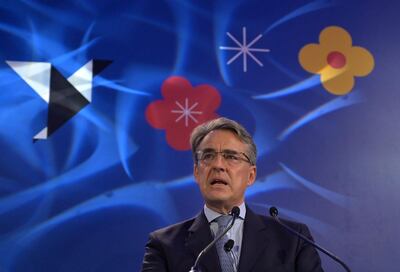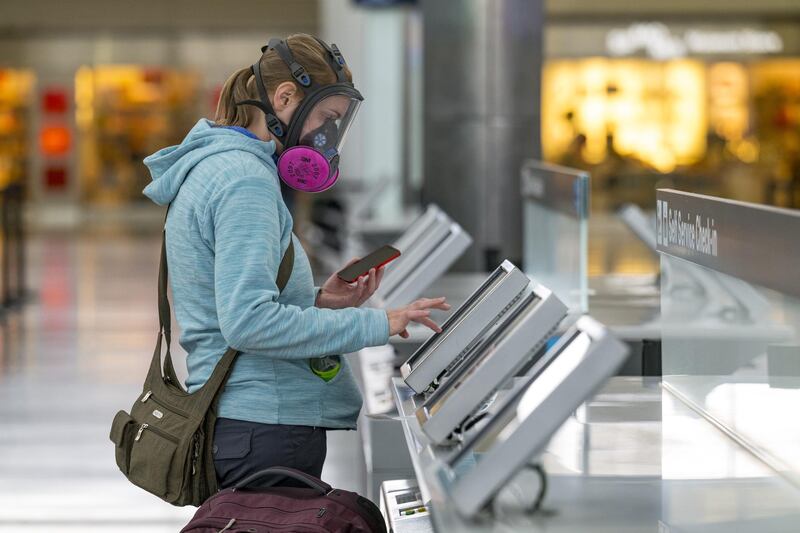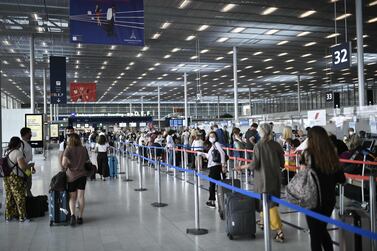Airlines are set to lose $157 billion (Dh576.69bn) this year and next amid a deepening slump in demand for the aviation industry caused by the damaging effects of the Covid-19 pandemic, according to the International Air Transport Association (Iata).
The bleak outlook is much worse that the $100bn in losses the Geneva-based airlines body expected for the two-year period, with the new deficit outlook now at $118.5bn for this year alone with a further $38.7bn next year.
Despite positive news around vaccines, the organisation, which represents almost 300 airlines worldwide, said the Covid-19 crisis “threatens the survival of the air transport industry" with 2020 likely to go down in history as its "worst" year ever.

“The financial damage of this crisis is severe. Government support has kept airlines alive to this point. More is likely needed as the crisis is lasting longer than anyone could have anticipated. And it must come in forms that that do not increase the already high debt load which has ballooned to $651bn,” said Iata director general Alexandre de Juniac.
"Bridging airlines to the recovery is one of the most important investments that governments can make. It will save jobs and kick-start the recovery in the travel and tourism sector which accounts for 10 per cent of global GDP (gross domestic product),” said Iata director general Alexandre de Juniac.
The industry’s losses for this year and next will be five times those accumulated during the 2008-2009 recession, said Iata, which expects the sector to turn cash positive again in the fourth quarter of next year, earlier than it initially suggested because of the recent vaccine breakthroughs.
Iata is in the final stage of developing a Travel Pass, a digital health document that will prove passengers have tested negative for Covid-19 or have had a vaccine, with a new app set to help kick-start international travel.
The pass, which will manage and verify the secure flow of testing or vaccine information among governments, airlines, laboratories and travellers, is on track for rollout in the first quarter of next year.
However, this is too late to rectify the damage already caused by Covid-19 this year, with passenger numbers expected to drop to 1.8 billion from 4.5 billion in 2019, according to Iata estimates, and only a partial recovery to 2.8 billion next year.
"What we can do is push for policies like effective testing, which would mean that the travel industry and governments could work with travellers who we know are not infectious," Brian Pearce, Iata’s chief economist, told a media briefing on the body's annual general meeting.
"When the vaccine arrives, that will allow more certain projections of the future. But clearly, there's a lot of uncertainty around the behaviour of the virus, as well as the policies of governments, which means that our forecasts are our best estimates."
Iata’s outlook assumes some borders that remain closed will reopen by the middle of next year, facilitated by a combination of Covid-19 testing measures and vaccine deployment.
Travellers arriving in England, for example, will be able to cut their quarantine time by more than half from December 15 if they pay £120 to take a private Covid-19 test after five days, according to new rules.
Under the test and release plan, people will be allowed to leave quarantine early after returning a negative result to a test provided by a private firm. This comes weeks after the UK reopened its air corridor with the UAE, allowing passengers flying from the Emirates to avoid the 15-day isolation period altogether.
Moves likes this were praised by Mr de Juniac, who wants to see more states lift travel-stifling quarantine measures and replace them with effective testing programmes.
"We are seeing states progressively coming to listen to us," he said.
While some governments and airlines such as Australia's Qantas say passengers may need a vaccination for long-haul travel, that approach is unlikely to work everywhere, Mr de Juniac said.
"It would prevent people who are refusing (the vaccine) from travelling," the Iata chief said. "Systematic testing is even more critical to reopen borders than the vaccine."
Air cargo, one of the only bright spots for the industry as the grounding of flights pushes freight prices higher, will see global revenue rise 15 per cent to $117.7bn this year despite an 11.6 per cent decline in volume to 54.2 million tonnes, Iata said.
This could be boosted by vaccine distribution in months to come with Mr Pearce adamant that air cargo carriers can absorb the extra demand next year.
"This is peak season for cargo, because of the supply chains around consumer electronics and all the product releases and there's a real shortage of capacity today," he said.
"That capacity will not be used by normal cargo services to the same extent in the first part of next year, which would free that capacity up for vaccine distribution."
Iata estimates it will take about 7,000 Boeing 747 equivalents to distribute one dose of the vaccine around the world to everyone in the population, he said.
Iata’s economic outlook comes as airlines hope the recent moves toward testing for passengers combined with the rollout of the first Covid-19 vaccines next year will spur governments to ease travel restrictions further to boost the industry.
Mr Pearce said there is clearly pent-up demand for leisure travel as people look to visit friends and family, but while air cargo carriers will return to pre-crisis levels next year, passenger airlines are looking at years rather than months before they hit pre-pandemic demand.








